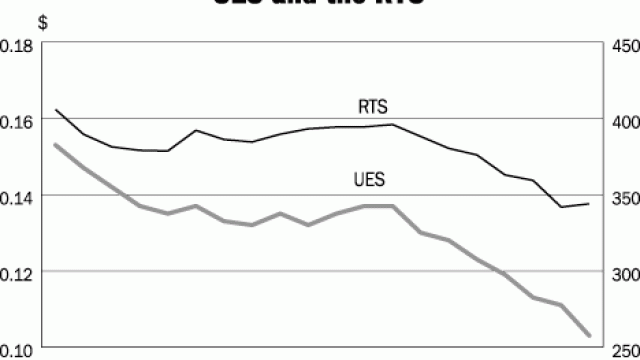Recent weakness in U.S. and European markets, a growing mistrust of UES management as industry restructuring unfolds and a government cap on electricity tariffs have led investors to abandon the stock, which has lost more than a third of its value -- $2.32 billion -- in the last month.
It now has a market capitalization of $4.39 billion.
Analysts said it most likely will get worse before it gets better for the world's largest electricity grid.
"I think the summer will be rather hard for UES shares as no good news is expected," said Troika Dialog energy analyst Kakha Kiknavelidze.
UES hit an all-time high of 46.87 cents on July 8, 1997, and an all-time low of 1.55 cents shortly after the government defaulted on its debts and devalued the ruble in August 1998.
Since January 2000, the stock has been as high as 21.1 cents on March 24, 2000, and as low as 7.08 cents, which it hit Jan. 3, 2001.
Long Russia's most liquid stock, accounting for about one-third of daily trading volumes on the benchmark dollar-denominated Russian Trading System, UES has a history of volatility.
"It's one of the most liquid papers; it grows faster than the others and falls down faster," CentreInvest trader Alexander Pankov said.
Alfa Bank analyst Andrei Rudenko said it was difficult to compare the dramatic fall in UES simply because the company, and the massive overhaul it is undergoing, are so unique. He said the last time he remembered a stock fluctuating as wildly as UES is now was in 2000, when metals giant Norilsk Nickel was revamping its operations and implementing a complicated share swap.
"But it's hard to compare because Norilsk shares are not as liquid," Rudenko said. "UES is unique because it is the only blue chip company undergoing such a painful process of reforming."
Analysts are split, however, as to just how far the stock will drop.
While Kiknavelidze and Rudenko said they expected it to shed another 20 percent to 30 percent over the next several weeks, Pankov said UES would intervene and start buying its own shares at 10 cents.
"We've seen UES fall down many times, but we've also seen sharp growth," Pankov said.
Others, however, see little hope at all.
"There is no reason for UES growth," said Fyodor Tregubenko of Brunswick UBS Warburg.
With no competition in the market, the revenue stream of state-controlled UES -- one of three so-called natural monopolies, along with the national railroads and Gazprom -- is essentially set by the government.
At a meeting last week to set tariffs from July 1, UES was the big loser as the Cabinet decided to let Gazprom raise prices by 15 percent, the Railways Ministry by 6.8 percent and UES by just 2.4 percent.
Furthermore, current tariff guidelines for 2003 would allow UES only a 15 percent increase, which is barely more than the expected level of inflation.
UES spokesman Yury Melekhov said Monday that due to the government's decision on tariffs half of the 72 regional utilities that UES controls will post a loss this year.
"Though external factors influence UES shares a lot, the government built in such a low profit margin for the company" that it may even post a loss, he said.

… we have a small favor to ask. As you may have heard, The Moscow Times, an independent news source for over 30 years, has been unjustly branded as a "foreign agent" by the Russian government. This blatant attempt to silence our voice is a direct assault on the integrity of journalism and the values we hold dear.
We, the journalists of The Moscow Times, refuse to be silenced. Our commitment to providing accurate and unbiased reporting on Russia remains unshaken. But we need your help to continue our critical mission.
Your support, no matter how small, makes a world of difference. If you can, please support us monthly starting from just $2. It's quick to set up, and you can be confident that you're making a significant impact every month by supporting open, independent journalism. Thank you.
Remind me later.


